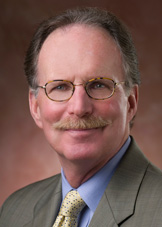Legislators Blast UW Yet Again
Legislators accuse officials of "flagrant violations" for continuing to use Internet service provider WiscNet.
Two years ago, the state Legislature moved to sever the University of Wisconsin’s ties to a provider of Internet service. Now some lawmakers are outraged that the UW System has picked this same provider to continue serving its campuses.
“There have been repeated, flagrant violations of state law, intentional deception at a level that I just am flabbergasted by, even today, and no accountability for it whatsoever,” said state Rep. Dean Knudson, R-Hudson, at a recent budget committee hearing.

Kevin Reilly, President of the University of Wisconsin System. Photo from UW System .
In a May 23 letter sent to UW System president Kevin Reilly, state Sen. Paul Farrow, R-Pewaukee, accused UW officials of “mismanagement and unethical behavior,” saying they’d shown disdain for the Legislature and contempt for the laws and directives it passed.
At issue is the UW System’s relationship with WiscNet, a membership-based nonprofit that provides Internet services to UW campuses, school districts, local governments and others. Its staff includes UW employees and its operations are integrated with those of the UW, according to a state report.
The Wisconsin State Telecommunications Association, representing mostly rural providers, believes this arrangement violates a 2005 state law that bars the UW from competing with private sector telecom providers. The UW argued that this provision didn’t apply, because WiscNet was a separate entity.
In 2011, the Legislature’s powerful budget-writing panel made the prohibition more explicit. The UW was directed to comply by July 1, 2013.
This prompted Ed Meachen, UW System associate vice president for learning and information, to suggest it was “time to vote the governor and Legislature out of office through a grassroots campaign,” according to an email obtained by WSTA.
Meachen, since retired, also co-authored an email listing “civil disobedience” — deliberately ignoring the Legislature’s directive — as a possible response.
And WiscNet executive director David Lois, in a December 2011 email, said he was “okay with saying WiscNet is going out of business for hyperbolic impact in some venues,” even though “we are a strong and viable nonprofit business.”
Lois, in an interview, says he was trying to convey that WiscNet needed to be careful about what it told customers about the possible harm from this decision.
Last December, the UW put out a request for proposals for a multi-campus Internet provider. On May 22, it announced its pick: WiscNet.
The UW, in a statement, called the procurement process “open, rigorous and competitive.”
But Bill Esbeck, WSTA’s executive director, calls it “bogus from the start.” He says the process was rigged to favor WiscNet: “The UW simply created an RFP that matched what WiscNet was already doing.”
On June 6, both losing bidders, AT&T and CenturyLink, filed formal protests. They allege that the new arrangement continues to violate the state law, by letting WiscNet use the UW’s infrastructure as it competes with commercial providers.
Contract details, including the amount the UW System will pay, are still being negotiated. Lois says WiscNet is “trying to be as cost-competitive as possible.” In 2010-11, UW institutions paid WiscNet about $2 million, according to a Legislative Audit Bureau report.
That report, released last December, identified $2.3 million in improper excess payments from the UW System to WiscNet, ostensibly for future years. But it also found that WiscNet charged substantially less than commercial providers.
Reilly, in an accompanying letter, warned that the Legislature’s action “will result in multi-million dollar increases in network costs.”
Farrow’s letter asked Reilly specific pointed questions, including what repercussions would ensue if the UW “signs an illegal contract with a vendor.” Farrow’s office says Reilly has not yet responded. An aide says Farrow hopes to hold a legislative hearing on WiscNet in late June or early July.
Bill Lueders is the Money and Politics Project director at the Wisconsin Center for Investigative Journalism (www.WisconsinWatch.org). The project, a partnership of the Center and MapLight, is supported by The Joyce Foundation.
The Center collaborates with Wisconsin Public Radio, Wisconsin Public Television, other news media and the UW-Madison School of Journalism and Mass Communication. All works created, published, posted or disseminated by the Center do not necessarily reflect the views or opinions of UW-Madison or any of its affiliates.
-
Wisconsin Lacks Clear System for Tracking Police Caught Lying
 May 9th, 2024 by Jacob Resneck
May 9th, 2024 by Jacob Resneck
-
Voters With Disabilities Demand Electronic Voting Option
 Apr 18th, 2024 by Alexander Shur
Apr 18th, 2024 by Alexander Shur
-
Few SNAP Recipients Reimbursed for Spoiled Food
 Apr 9th, 2024 by Addie Costello
Apr 9th, 2024 by Addie Costello






















No let’s not base our governmental service purchases on the best, most compatible, cost effective supplier. Let’s base them on the fantasy that somehow the “free market” always provides the better option. Or maybe, who contributes more money to our campaign for re-election.